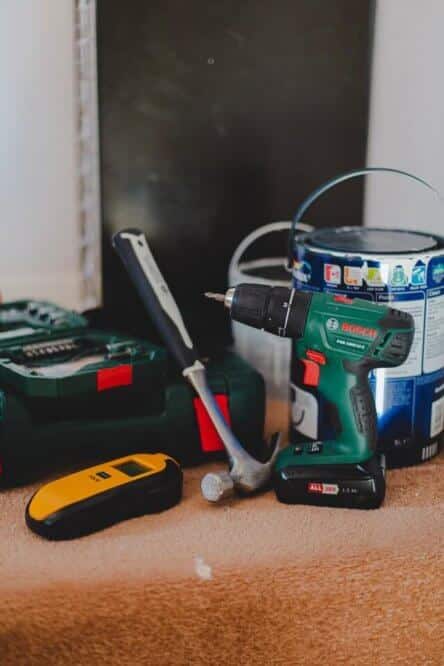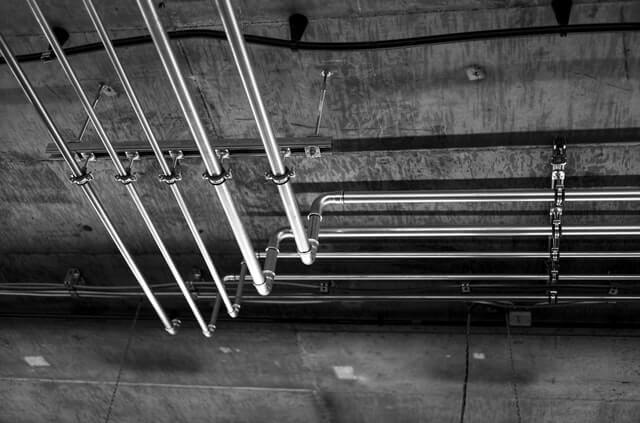Since the basement is a notoriously dark and damp place, moisture in basement is common. Nevertheless, moisture in basement is bad news and can become a big menace for a homeowner. It can lead to many problems, from structural damage to toxic mold. Therefore homeowners need to understand the cause of basement moisture and how to get rid of it.
Signs Of Moisture In Basement

The acceptable moisture levels in basement walls and floors will depend on many factors. However, a general rule of thumb is that the basement’s humidity level is not over 30 – 50 percent.
One way to measure the humidity level of a basement is by using a moisture meter. (1)
Nonetheless, if you suspect that you have moisture in your basement that can lead to problems, you will have to know how to identify the signs first.
Basement moisture might not be evident as you will not necessarily see a puddle of water on the floor. However, there are numerous other ways how moisture represents itself in your basement. Here are a few signs to look out for in your basement.
- There is a trickle of water coming out of the walls.
- The base of concrete walls are saturated.
- Damp basement walls.
- Condensation is present on the walls and floor.
- Basement floor wet spots are visible.
- The walls are stained or blistering.
- Paint and wallpaper is peeling off.
- Humid and damp air.
- The carpet or wood is deteriorating.
- Headers, columns, and joists are rotting.
- A mold or mildew odor or appearance on surfaces.
- Condensation present on the windows.
- The floor or walls are covered in efflorescence.
Sources Of Moisture In Basement

Generally there are usually three sources that can cause moisture in the basement.
- Rain Or Groundwater
When it rains, the rainwater can make its way inside to the basement through a leak. This usually happens in the absence of proper grading, downspouts, and gutters.
- Interior Moisture Sources
In some instances, the moisture in basement can originate from the inside. Moisture can come from dryers, showers, humidifiers, newly constructed concrete, cooking ect.
- Ventilation With Humid, Outside Air
When the weather is warm, homeowners often open basement windows to help with ventilation. However, humid air from the outside mixed with a cool basement can cause condensation on the walls and floors. (2)
Common Causes And Solutions For Basement Moisture
After understanding what source the moisture might be coming from, the next step is determining the cause. By knowing what is causing the moisture in the basement, you can find the right solution.
- An Interior Water Leak
There are numerous places where a water leak can originate inside your basement. Areas like a shower, sink, toilet, washing machine, dishwater, and a faulty pipe are just a few examples.
In some cases, the moisture might be coming from another room inside the house. For example, if a leak comes from a kitchen or bathroom above the basement, it can cause wet spots on the basement walls or ceiling.
By locating the area where the moisture is coming from, you can fix the problem. Luckily an interior leak is one of the most straightforward problems to solve as you simply need to repair it.
- Ineffective Grading
If the basement has poor grading, then resin or groundwater can often make its way in. Therefore, the ground around the foundation needs to slope away from the house. (3)
Water will accumulate against the foundation if water is draining in the wrong direction. Sometimes this happens if the dirt surrounding the foundation is not properly compacted. When the soil settles, the slope will change, and the water will flow towards the house instead of away.
The best way to fix the problem is to build up the dirt around the foundation of at least one inch per foot. It should create a slope that aims away from the house to solve the problem sufficiently.
If you find water in basement, know who to call! Ineffective grading is not an easy DIY fix unless you are an expert in this area. Therefore, finding a foundation repair expert who can inspect the problem and waterproof your basement would be best.
- Missing or Defective Gutters and Downspouts
The primary purpose of a gutter and downspout is to divert rainwater away from the home’s foundation. (4) If the gutter and downspout are absent, the rainwater will be directed towards the foundation. Eventually, the water will drain towards the house and accumulate in the soil. Water accumulation around the foundation will then end up in the basement over time.
One can simply repair or install a gutter to fix this problem. However, for this system to work correctly, a downspout should also be added. To ensure that the gutter and downspout are doing their job, maintenance should be done regularly to avoid clogs.
- Cracks in Your Foundation
Cracks in the foundation are a definite entryway for water. In some cases, the water itself is the cause of the foundation cracking. Therefore the rainwater must be directed away from the foundation.
Either way, whatever the cause of the cracks, it is evident that water will have a way to enter your basement if they are present.
The solution to cracks in the foundation will vary, depending on the cause of the cracks. If, for example, hydrostatic pressure is the cause, repairs to the exterior drainage should solve the problem.
The cracks themself will also need repairing, but it is essential to eliminate the cause first. If a structural problem is the cause, you will need appropriate footing and connections to seal gaps.
- Poor (or Missing) Drain Tile and Sump Pump
Many homeowners do not have a subsurface drainage systems installed. Thus, problems like clogged pipes and broken connections can occur, resulting in moisture in the basement.
Whether you need to fix a subsurface drainage system or install a new one, it is a task better left to professionals. The installation process involves digging up the flooring and adding a drain system to a pump, expelling moisture.
- Condensation
When warm, moist air comes in contact with a cool basement floor and wall, it will cause condensation. Moisture is created as the walls cool the warm air. Condensation issues are luckily easier to resolve than leaks or drainage problems.
Condensation can be dealt with in a few ways. A dehumidifier is one solution, but some homeowners want to know how to keep basement dry without dehumidifiers. This is because running a dehumidifier can increase the electricity bill.
First, you will need to check the exhaust of your dryer and drain the central air conditioner. It is crucial that it is not clogged and that it is flowing correctly.
One can either install a basement exhaust fan if there is a bathroom or kitchen in the basement. For example, an exhaust fan can be used to eliminate the steam from cooking or showering.
Another option is to increase air circulation. By increasing the air circulation, you can resolve minor condensation issues. The best way to do this is to keep vents open to keep air flowing. If you do not have an AC, you will need to add a fan to your basement and run it a few hours a day. This will help distribute moisture. It will also help get rid of clutter in the basement to allow better airflow.
The third solution to eliminate condensation in the basement is to install insulation. By insulating areas where condensation tends to build up, you will stop moisture. Walls, pipes, and ducts are usually the main areas to insulate. Proper insulation will keep warm air from coming in contact with cool surfaces.
One can also use a basement moisture absorber, like calcium chloride crystals or charcoal. These absorbers will draw wetness out of the air and leave the basement dry and smelling great. (5)
Read Next: Best Generator For Sump Pump
Final Thought
Moisture in basement can cause various problems that can lead to costly repairs. Therefore it is essential to be aware of moisture signs in the basement and know how to dry out a basement fast.
While problems like an insufficient drainage system are significant projects, most moisture problems can be taken care of by the homeowner. However, if you are uncertain about where the moisture is coming from, it is best to have an expert inspect your basement.
Either way, turning a blind eye to your basement moisture problem will only cause significant issues in the long run. Therefore it is best taken care of as soon as possible.

Michael Davis is a heating & plumbing expert who currently works as independent contractor in SC. He also writes for Plumbertip.
For almost 10 years he worked on various plumbing tasks across South Carolina.



